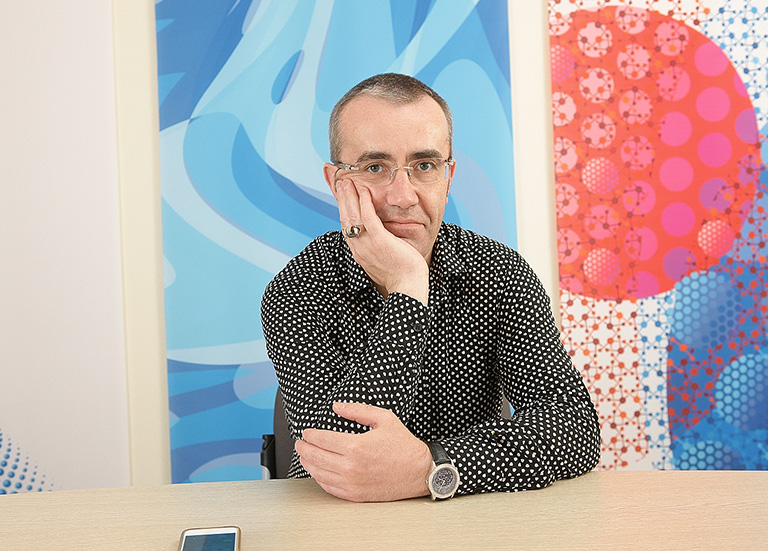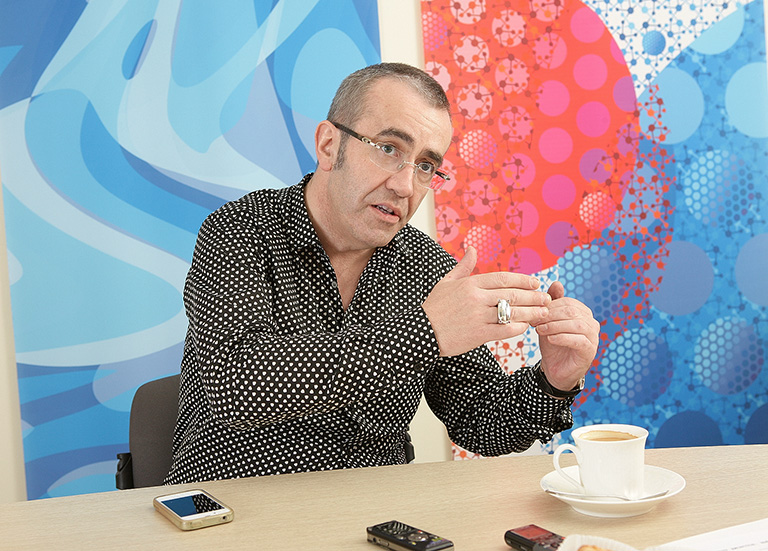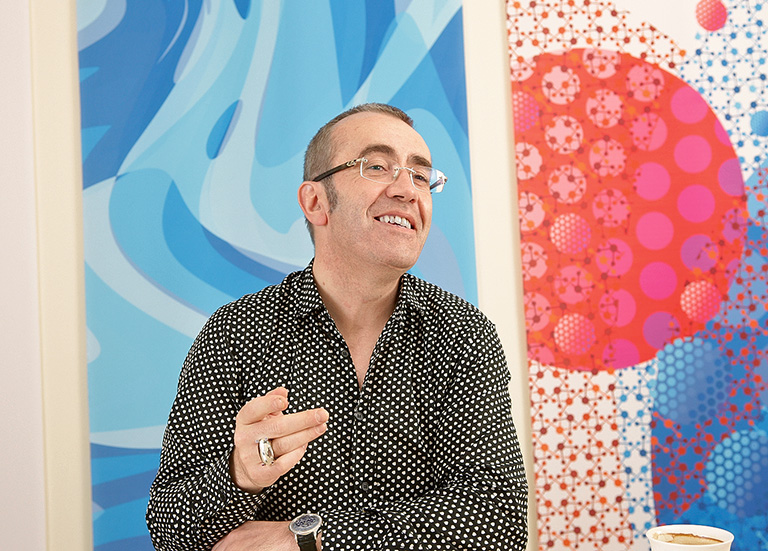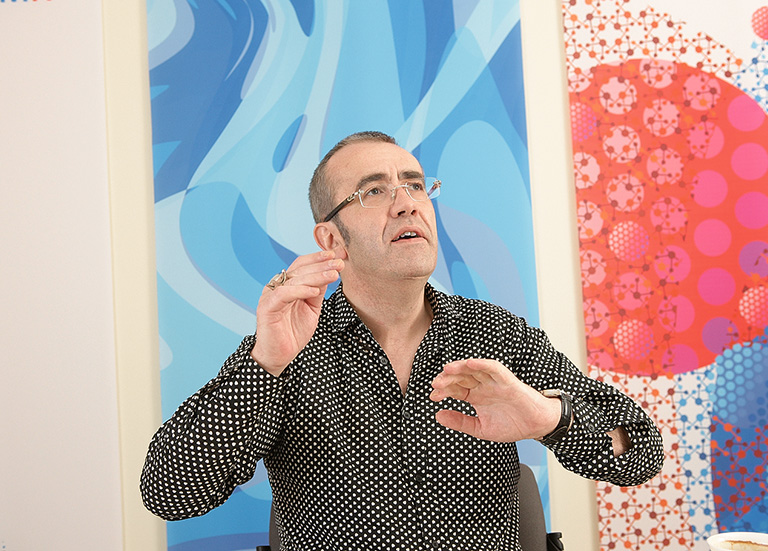
With full comfort
Print
23 September 2013
BIGRUSSIA, Svetlana Samodelova. Photo: Evgeny Dudin. Translated by: Jack Doughty
Irishman Garret Johnston feels at home in Moscow because he understands not only the Russian language, but also the Russian soul.
He speaks 11 languages, and it is said of him that he alone is worth a whole consultancy group. He has 25 years of experience in marketing behind him. He works mainly in the high-tech fields, and also in retail, in 13 countries on five continents. He is known in business circles as a man with an innovative way of thinking, well able to look at the world in his own way and break down preconceptions. Garrett Johnston, vice-president of Team Drive, told BIGRUSSIA about what a foreign intellectual is doing in Moscow.
«I began to study Russian in the eating houses and bars of Kiev»
 Before coming to Moscow, Garrett was able to learn the secrets of the Slavic soul in Kiev.
Before coming to Moscow, Garrett was able to learn the secrets of the Slavic soul in Kiev.
– I was working as a management consultant in the Norwegian Telenor group on questions of corporate marketing strategy. Norway is a rich country; at that time, investors had more capital than they could invest in their own homeland. Therefore, after the collapse of the USSR, Telenor took the risk of buying a big share in Ukraine’s biggest cell phone operator, “Kievstar”. It was a bold move to invest billions of dollars in a country like Ukraine in the nineties, when no-one knew if Kuchma would stay in power or not. At that time, Kievstar was beginning to lose its share of the market, and I was asked to help the management cope with this problem.
– Many people speak Russian in Ukraine. Was it difficult to learn the language?
– I have always found languages easy to learn. I probably inherited this aptitude. My father and grandfather knew many languages, I grew up in a home with Russian and Chinese newspapers and German and Arabic books lying on the table.
About Garrett Johnston:
He was born and grew up In Dublin, Ireland. He graduated from University College, Dublin. In 1991 he obtained a Master of International Commerce degree from Trinity College. He also passed courses in Executive Leadership Training at the London Business School. He has lived and worked in Great Britain, France, Germany, North and South America, Australia, in the Middle East, and also in some countries in Eastern Europe: Poland, Bulgaria, the Czech Republic, Romania, Albania, Ukraine and Russia. He has held leading positions in the marketing field in a number of major international corporations, such as Cap Gemini, Ernst & Young, Cable & Wireless, PricewaterhouseCoopers, Alcatel and MCI WorldCom. From February 2006 to 2010, he was the strategic marketing director of MTS. From January 2012 to the present, he has been vice-president for marketing of the company Team Drive.
When I came to Ukraine, my knowledge of Russian was poor. I went on special courses and learned the basics. I studied the language “by immersion”, so to speak, for which I made a point of going to the suburbs of Kiev. I sat down in various eating houses and bars, and watched for hours what mimicry and gestures ordinary people used in pronouncing various words. Whatever the elite think about it, a people’s culture comes from below. It was important to me to understand the culture and study people’s psychology. I listened and took in how and with what intonation the customers talked to each other. It was in these dives that I mastered the body language and learned many expressions.
– How did you end up in Moscow?
– A dispute about Kievstar arose between the Norwegian company Telenor and the Russian Altimo (Alpha-Telecom). It became uncomfortable to work there. It just so happened that at that time, I was offered a job by MTS, the Russian telecommunications company.
We came to an agreement that I would not have to deal with Ukraine, and would not have to act against Kievstar. That decided the matter. I accepted the offer, and arrived in Moscow at the beginning of 2006.
– What were your first impressions, after Kiev?
– A certain difference in mentality was apparent, for example in relation to money. In Kiev, if you dined in company in a cafe, as a rule each one would pay for himself, calculating the amount from the bill. But in Moscow, as in Ireland, normally only one person pays for the dinner, and then everyone chips in some money; no-one works out his debt to the last kopek. People are big-hearted in Moscow.
In Moscow, as in Ireland, normally only one person pays for the dinner. People are big-hearted in Moscow.
Another example. I remember conducting an experiment in Kiev. I used to sit in a respectable restaurant, chat to a couple of girls, and their first question was most often “What’s your job?” I’d reply that I was out of a job right then. After a minute or two, one of the girls would go to the toilet “to powder her nose”, after which the other one would disappear. In Moscow, they’d carry on chatting to me, say they were sorry to hear that, and even offer to help.
– Foreigners often comment that Muscovites don’t smile, they look gloomy. Have you noticed that?
– Yes. At first I couldn’t understand why people looked so preoccupied. But then I realised that they just don’t do “duty smiles”. All smiles are honest. If someone smiles at you, it’s very sincere, from the heart. Russians are very creative – they know better than many people in other parts of the world how to think up ideas and concepts, but when it comes to putting them into practice, the Russians are not so good at it.

If you look at the world economy, it is divided into two parts: some countries are good at thinking up innovative ideas, and others are better at putting them into practice. The Chinese, for example, specialise in putting into practice concepts thought up in other countries. But a significant part of the profit from new products is more and more shifting from the executors to the inventors, to the creators of intellectual value, to those who think up and generate ideas. Take for example this iPhone lying on the table in front of us. Ninety-two per cent of the profit from this product stays in California, where creative people worked out how best to connect people to each other and to artificial intellect. And for the places where it is assembled, for example China, and where the sales networks have been built up, only eight per cent of the profit is left.
Russians are very creative – they know better than many people in other parts of the world how to think up ideas and concepts, but when it comes to putting them into practice, the Russians are not so good at it.
Anyway, it seems to me that the Chinese economy’s tendency to copy the ideas of others is becoming more and more risky. For example, have you heard of the creation of domestic three-dimensional printers, which print not documents, but actual three-dimensional objects? A development of this idea might be the creation on the basis of this technology of an industrial alternative to hugely expensive industrial machines. Imagine that this technology will be widely accessible in industry in as little as ten years from now. Who will then need China with its cheap labour force? After all, then it will be possible simply to “print” many things, whether in Russia or in England. And Russia, with such a turn of events, will find itself in a very favourable position, because Russian creative potential will be in demand throughout the world. Scientific creativity, inventiveness – this is surely the best that could be. It is the most profitable segment of the economy of the future.
«Power is people»
– Many foreigners are afraid of bureaucracy and corruption in Russia. Have you come up against obstacles created by Russian officials?
– Any serious person in any country must know how to come to agreement with the authorities and to secure their support, at both local and federal levels. Or hire competent people who can take your concept to the authorities and obtain approval for your project.
But on the whole, what is power? Power is people. It is a priority to cooperate with them and come to agreement with them. For example, if I plan to open a small shop on Kalanchevskaya Street, the first thing that has to be done is to find out from the local people how and in what form this can best be done to make it more necessary and attractive to them. If the locals take part in developing the concept and design of this shop, they will become its loyal customers. It is important to remember that the main power comes from people, not from the government.
– Have you had problems with Russian partners?
– I have only had positive experience of working with Russian partners, I have not come across any unreliable people along the way. But I should like to say that as a rule, businessmen in Moscow only make short term plans. They probably think that everything may well be very different tomorrow. It is easy to talk to them about plans for next year, but hard to talk about plans for the next decade. It’s difficult to explain to them that money has to be invested over the long term, that it’s more profitable that way.
As a rule, businessmen in Moscow only make short term plans. They probably think that everything may well be very different tomorrow.
– What is the Russian consumer like? How does he differ from the Western one?
– The main difference between the Russian consumer and the Western one is that he is not specifically asked how he would like to see the goods or the service. His potential as a source of necessary information and as the main element in the creative chain is very rarely called upon. The consumer has low expectations, the specific nature of Russian business has taught him to think in terms of price: to look for where it is cheaper. Quality is a secondary matter. But on the whole, I don’t think there is much cultural difference between Russian and Western consumers.

– What are the special features of the Russian market?
– Many forecasts say that by 2020, it is Russia which may become the country with the strongest economy. Some estimates also say that 50-60% of its market space is now unoccupied. That means that there is a huge prize on the table. And the chance to pick up this 60% will go to the one who can respond correctly and in good time to the requirements and wishes of the clients.
– What difficulties in your work have you come up against in Russia?
– There have not been any particular difficulties. But I’ll tell you one thing that seemed strange. That is the system of administrative orders and declarations – at all levels, in all Russian organisations. Here, you very often have to write service notes about all sorts of things, which takes a lot of time. What’s the need for them? It’s a mystery to me.
– Many foreigners comment that the socialist past has killed any initiative in Russians. Is this so?
– Yes, this does in fact appear so at times. Russians often want to hear, what exactly something is, literally from one end to the other, and on top of that what exactly they should do. Without even asking why. But if I have to tell you everything in the smallest detail every time, what use are you to me?
In this connection, I should like to give this advice to businessmen working in Moscow: give your fellow workers room to spread their wings, inculcate initiative in them, and then you will be amazed at their creative potential and at the results their labour can achieve.
– What does Team Drive do? By whom and when was it created?
– The company was founded in 2011 by a team of professional managers with successful experience of efficient management of large projects and firms. One of the founders is Leonid Melamed, who previously headed AFK “Sistema” and before that MTS, where we had experience of working successfully together. It was he who asked me to join the team. Leonid always welcomed variety in approaches and a fresh objective view. This was particularly in demand in his new business.
Russian capital, brands, ideas and people can and must change the whole world for the better.
The basic idea of the business is creating, or significantly increasing the value of, clients’ assets by efficient top-grade management. We are convinced that many Russian companies, ideas, concepts and brands are considerably undervalued, and from the point of view of their potential not only in Russia, but in the world as a whole. Our task is to determine this potential and the fullest way of realising it. Russian capital, brands, ideas and people can and must change the whole world for the better.
«You only have to live in Moscow for a month to realise that there is nothing to be afraid of here».
– Do you have your own apartment in Russia?
– Yes, in Moscow. And I bought it a long time ago, in 1993, from a friend who was emigrating out of Russia. I bought it without even understanding why at the time. The apartment was not used for a long while, there was no need for it, but then it became very useful.
– Is it all that necessary to know Russian if you live in Russia, or are there now enough businessmen who speak English?
– There are two extremes here. People either know English very badly or not at all, or they know it excellently. And there are more and more of the second category. But I think the foreign specialist should speak his clients’ language in any country. For example, I recently had to speak in Holland. Canadians came onto the platform and spoke in English. I spoke in Dutch, and this made a strong impression on the audience. You are taken more seriously and trusted more if you are so interested in a country that you even learn its language. Furthermore, a knowledge of the language is a considerable help in penetrating into the specifics and understanding the nuances of your partners and clients.
– What would you say to those foreigners who are still in two minds about whether it is worth coming to work in Moscow or not?
– I would ask them the reasons for their doubts. Many are worried about the Russian Mafia. This is complete nonsense. I would advise them not to waste time on doubts, but to concentrate on analysis. At the present time, there are far more opportunities for carrying out ideas and projects in Moscow than in any other European capital.
At the present time, there are far more opportunities for carrying out ideas and projects in Moscow than in any other European capital.
– Many are afraid that crime is on the rampage. Are you not afraid to walk around in Moscow and its suburbs on foot?
– This is one of the stereotypes, that foreigners are afraid of crime in Russia. You only have to live in Moscow for a month to realise that there is nothing to be afraid of here. And there are petty hooligans everywhere, not just in Moscow.
– I sense that you find it very comfortable to live and work in Moscow. Tell me, Garrett, are there traits in Russians that make them akin to the Irish?
– There are. For example, imagine an identical Saturday evening party in different cities – in London, Dublin and Moscow. It’s 9pm, everyone is eating, talking, drinking, having a good time. But at two in the morning, the polite Englishman politely hints to his guests that it’s time for them to go home. But the Irishman, like the Russian, can stay on as a guest till Tuesday.

– How do you spend your spare time?
– I like to go to the extremely beautiful garden of the Hermitage, lie on the lawn and read, read, read.
– What do you read?
– Newspapers, books. The Financial Times, the Irish Times and the Guardian in English, the Neue Zurcher Zeitung and the Frankfurter Allgemeine Zeitung in German, Le Monde and Le Canard Enchaine in French. I am now reading the book On Intelligence, by Jeff Hawkins. It is about attempts to create an artificial intellect.
– You have a favourite place in Moscow, the Hermitage garden. Do you have one in Ireland?
– The beach at Glenbeigh in County Kerry. Six kilometres of soft golden sand, the Atlantic Ocean, and just me, my dog and the seagulls. That’s a place where you don’t have to think about anything.
– Do you have a recipe for dealing with Moscow traffic jams?
– The Moscow administration would find it worthwhile to study and try to adapt the European system of “integrated transport”, including road infrastructure, signs, driving rules, driving standards and the system of organisation of public transport. But I expect they have their own recipe.
All Portfolio
MEDIA CENTER
-
The RMI group has completed sertain projects
The RMI Group has exited from the capital of portfolio companies:
Marinus Pharmaceuticals, Inc.,
Syndax Pharmaceuticals, Inc.,
Atea Pharmaceuticals, Inc.

